Lidl's International Strategy: Mexico vs. Norway Market Evaluation
VerifiedAdded on 2022/12/26
|30
|6801
|54
Report
AI Summary
This report provides a comprehensive analysis of Mexico and Norway as potential markets for Lidl's international expansion strategy. It begins with an executive summary outlining the methodology, which includes a comparative PESTEL analysis of the macro-environmental factors in both countries to identify the most attractive market. The report then delves into a detailed discussion of the rationale for selecting Mexico, supported by a thorough evaluation of the PESTEL factors. Lidl's internal environment is assessed using the VRIO framework to evaluate its resources and capabilities. Porter's Five Forces model is applied to analyze the competitive landscape within the Mexican retail market. Finally, the report evaluates different modes of entry, recommending a strategic alliance as the most suitable approach for Lidl's global expansion. Appendices provide additional data and analysis, including a detailed PESTEL analysis of both markets. The report concludes that Mexico, despite its challenges, presents a more advantageous market for Lidl's expansion due to its economic factors and middle-class consumer base. The analysis also considers the bargaining power of suppliers and customers, threat of substitutes, and competitive rivalry in the Mexican retail industry.
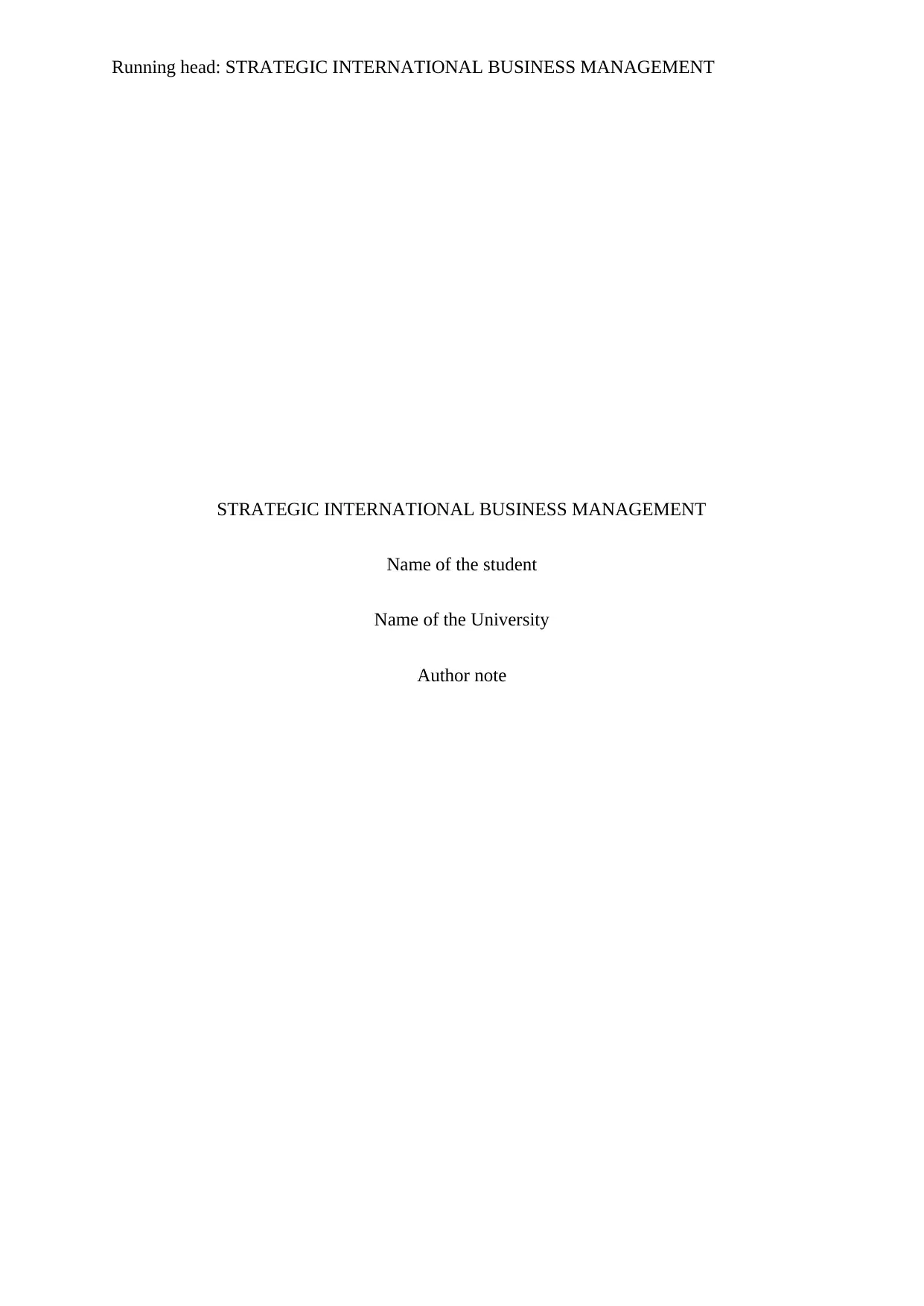
Running head: STRATEGIC INTERNATIONAL BUSINESS MANAGEMENT
STRATEGIC INTERNATIONAL BUSINESS MANAGEMENT
Name of the student
Name of the University
Author note
STRATEGIC INTERNATIONAL BUSINESS MANAGEMENT
Name of the student
Name of the University
Author note
Paraphrase This Document
Need a fresh take? Get an instant paraphrase of this document with our AI Paraphraser
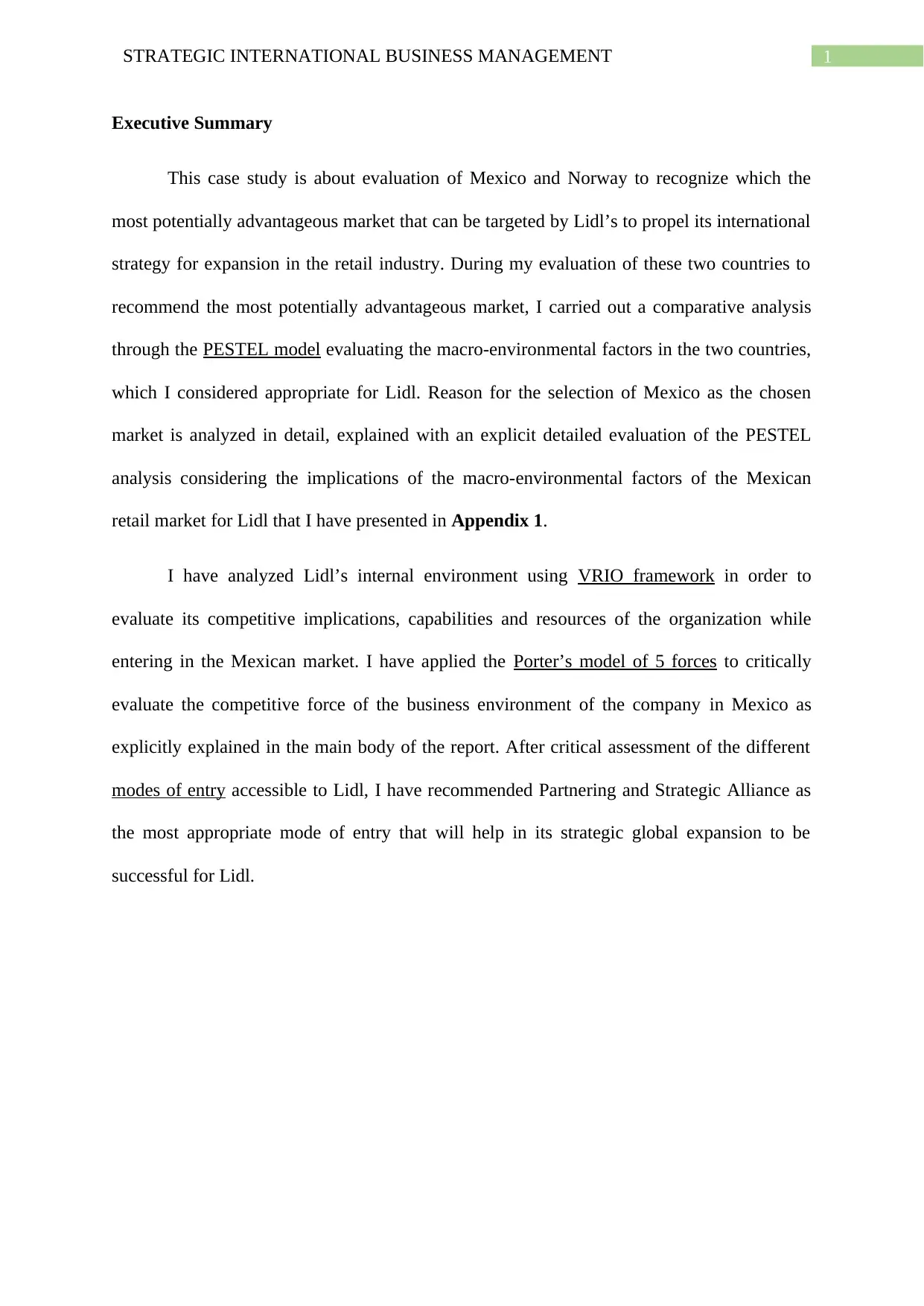
1STRATEGIC INTERNATIONAL BUSINESS MANAGEMENT
Executive Summary
This case study is about evaluation of Mexico and Norway to recognize which the
most potentially advantageous market that can be targeted by Lidl’s to propel its international
strategy for expansion in the retail industry. During my evaluation of these two countries to
recommend the most potentially advantageous market, I carried out a comparative analysis
through the PESTEL model evaluating the macro-environmental factors in the two countries,
which I considered appropriate for Lidl. Reason for the selection of Mexico as the chosen
market is analyzed in detail, explained with an explicit detailed evaluation of the PESTEL
analysis considering the implications of the macro-environmental factors of the Mexican
retail market for Lidl that I have presented in Appendix 1.
I have analyzed Lidl’s internal environment using VRIO framework in order to
evaluate its competitive implications, capabilities and resources of the organization while
entering in the Mexican market. I have applied the Porter’s model of 5 forces to critically
evaluate the competitive force of the business environment of the company in Mexico as
explicitly explained in the main body of the report. After critical assessment of the different
modes of entry accessible to Lidl, I have recommended Partnering and Strategic Alliance as
the most appropriate mode of entry that will help in its strategic global expansion to be
successful for Lidl.
Executive Summary
This case study is about evaluation of Mexico and Norway to recognize which the
most potentially advantageous market that can be targeted by Lidl’s to propel its international
strategy for expansion in the retail industry. During my evaluation of these two countries to
recommend the most potentially advantageous market, I carried out a comparative analysis
through the PESTEL model evaluating the macro-environmental factors in the two countries,
which I considered appropriate for Lidl. Reason for the selection of Mexico as the chosen
market is analyzed in detail, explained with an explicit detailed evaluation of the PESTEL
analysis considering the implications of the macro-environmental factors of the Mexican
retail market for Lidl that I have presented in Appendix 1.
I have analyzed Lidl’s internal environment using VRIO framework in order to
evaluate its competitive implications, capabilities and resources of the organization while
entering in the Mexican market. I have applied the Porter’s model of 5 forces to critically
evaluate the competitive force of the business environment of the company in Mexico as
explicitly explained in the main body of the report. After critical assessment of the different
modes of entry accessible to Lidl, I have recommended Partnering and Strategic Alliance as
the most appropriate mode of entry that will help in its strategic global expansion to be
successful for Lidl.
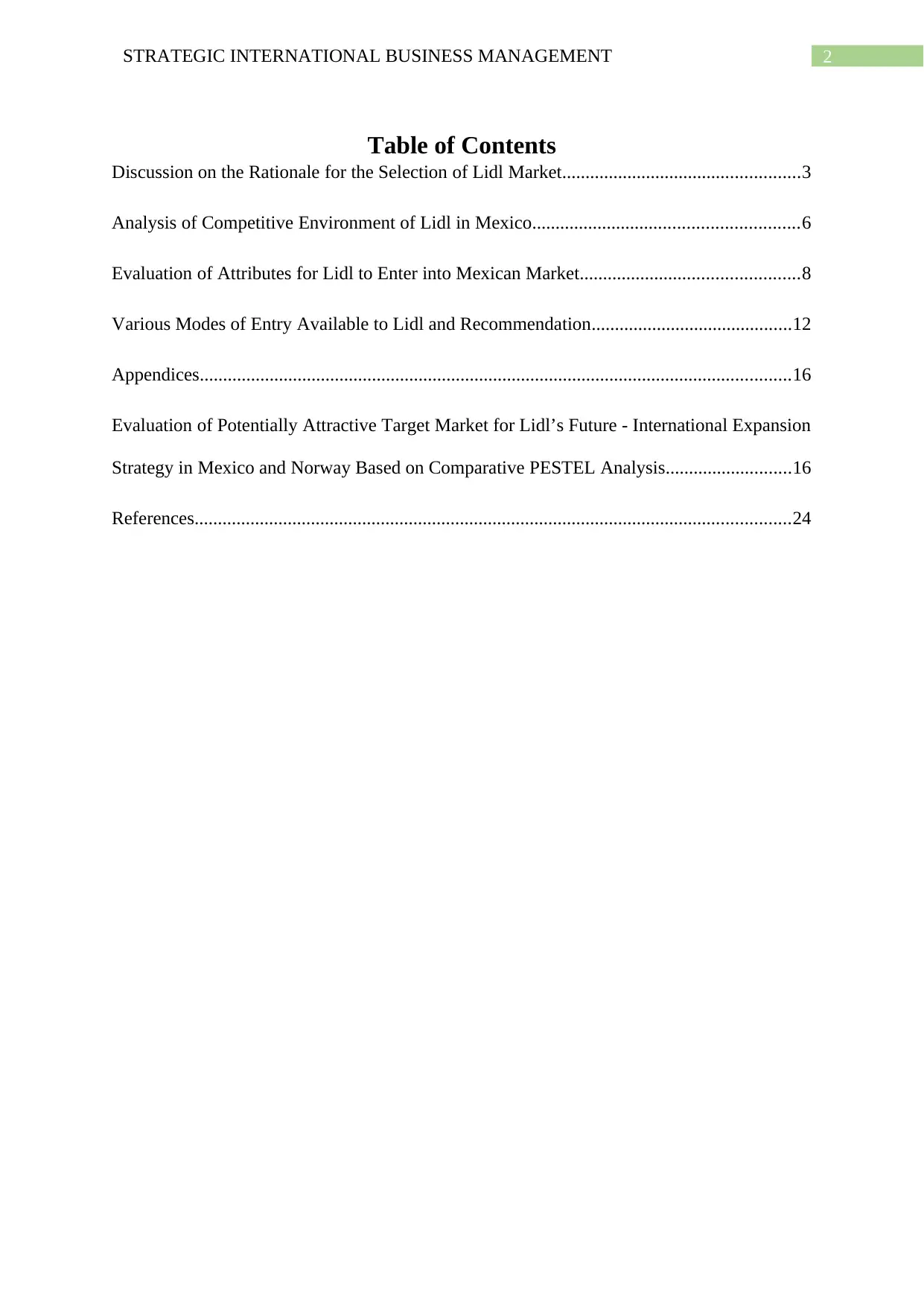
2STRATEGIC INTERNATIONAL BUSINESS MANAGEMENT
Table of Contents
Discussion on the Rationale for the Selection of Lidl Market...................................................3
Analysis of Competitive Environment of Lidl in Mexico.........................................................6
Evaluation of Attributes for Lidl to Enter into Mexican Market...............................................8
Various Modes of Entry Available to Lidl and Recommendation...........................................12
Appendices...............................................................................................................................16
Evaluation of Potentially Attractive Target Market for Lidl’s Future - International Expansion
Strategy in Mexico and Norway Based on Comparative PESTEL Analysis...........................16
References................................................................................................................................24
Table of Contents
Discussion on the Rationale for the Selection of Lidl Market...................................................3
Analysis of Competitive Environment of Lidl in Mexico.........................................................6
Evaluation of Attributes for Lidl to Enter into Mexican Market...............................................8
Various Modes of Entry Available to Lidl and Recommendation...........................................12
Appendices...............................................................................................................................16
Evaluation of Potentially Attractive Target Market for Lidl’s Future - International Expansion
Strategy in Mexico and Norway Based on Comparative PESTEL Analysis...........................16
References................................................................................................................................24
⊘ This is a preview!⊘
Do you want full access?
Subscribe today to unlock all pages.

Trusted by 1+ million students worldwide
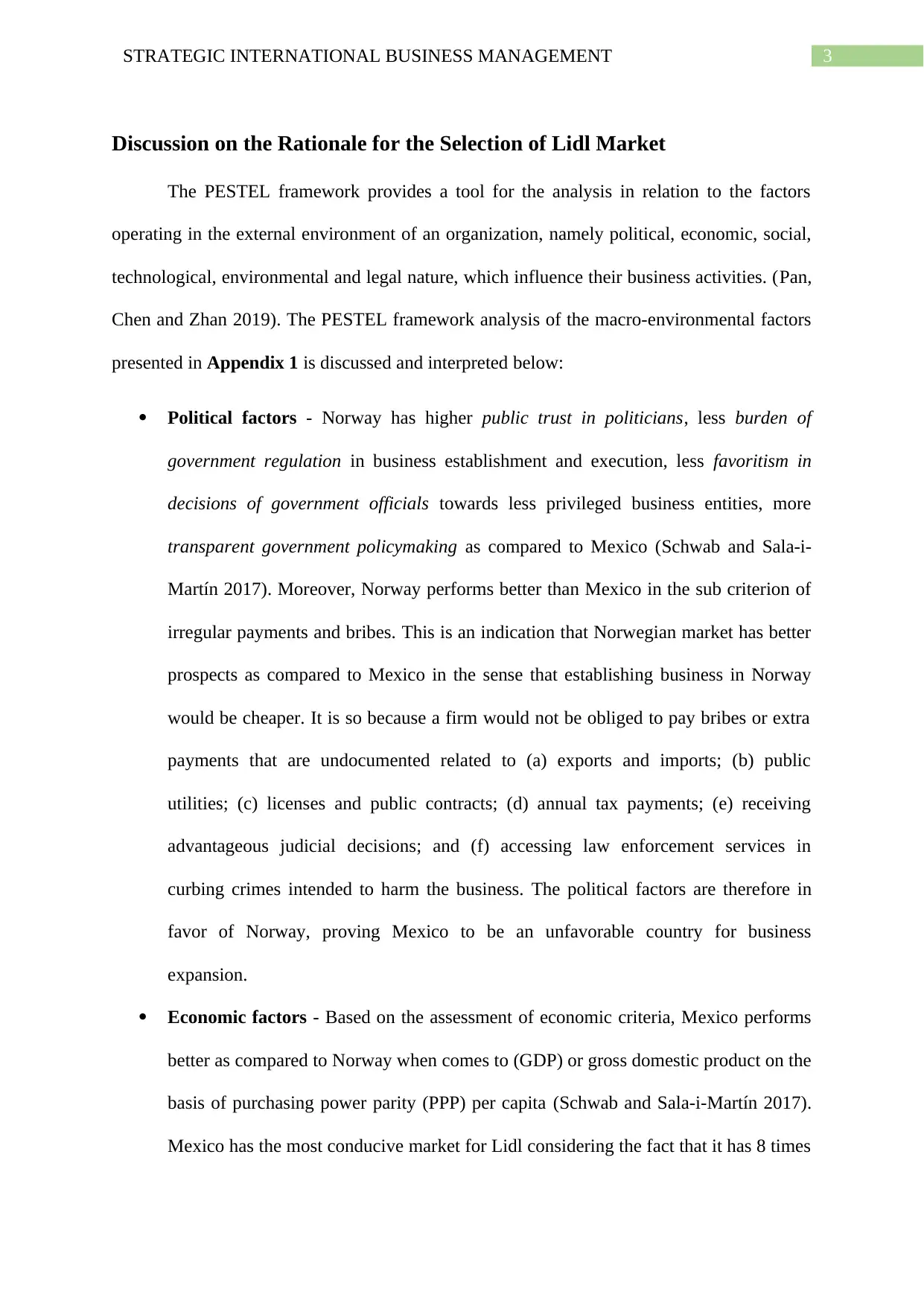
3STRATEGIC INTERNATIONAL BUSINESS MANAGEMENT
Discussion on the Rationale for the Selection of Lidl Market
The PESTEL framework provides a tool for the analysis in relation to the factors
operating in the external environment of an organization, namely political, economic, social,
technological, environmental and legal nature, which influence their business activities. (Pan,
Chen and Zhan 2019). The PESTEL framework analysis of the macro-environmental factors
presented in Appendix 1 is discussed and interpreted below:
Political factors - Norway has higher public trust in politicians, less burden of
government regulation in business establishment and execution, less favoritism in
decisions of government officials towards less privileged business entities, more
transparent government policymaking as compared to Mexico (Schwab and Sala-i-
Martín 2017). Moreover, Norway performs better than Mexico in the sub criterion of
irregular payments and bribes. This is an indication that Norwegian market has better
prospects as compared to Mexico in the sense that establishing business in Norway
would be cheaper. It is so because a firm would not be obliged to pay bribes or extra
payments that are undocumented related to (a) exports and imports; (b) public
utilities; (c) licenses and public contracts; (d) annual tax payments; (e) receiving
advantageous judicial decisions; and (f) accessing law enforcement services in
curbing crimes intended to harm the business. The political factors are therefore in
favor of Norway, proving Mexico to be an unfavorable country for business
expansion.
Economic factors - Based on the assessment of economic criteria, Mexico performs
better as compared to Norway when comes to (GDP) or gross domestic product on the
basis of purchasing power parity (PPP) per capita (Schwab and Sala-i-Martín 2017).
Mexico has the most conducive market for Lidl considering the fact that it has 8 times
Discussion on the Rationale for the Selection of Lidl Market
The PESTEL framework provides a tool for the analysis in relation to the factors
operating in the external environment of an organization, namely political, economic, social,
technological, environmental and legal nature, which influence their business activities. (Pan,
Chen and Zhan 2019). The PESTEL framework analysis of the macro-environmental factors
presented in Appendix 1 is discussed and interpreted below:
Political factors - Norway has higher public trust in politicians, less burden of
government regulation in business establishment and execution, less favoritism in
decisions of government officials towards less privileged business entities, more
transparent government policymaking as compared to Mexico (Schwab and Sala-i-
Martín 2017). Moreover, Norway performs better than Mexico in the sub criterion of
irregular payments and bribes. This is an indication that Norwegian market has better
prospects as compared to Mexico in the sense that establishing business in Norway
would be cheaper. It is so because a firm would not be obliged to pay bribes or extra
payments that are undocumented related to (a) exports and imports; (b) public
utilities; (c) licenses and public contracts; (d) annual tax payments; (e) receiving
advantageous judicial decisions; and (f) accessing law enforcement services in
curbing crimes intended to harm the business. The political factors are therefore in
favor of Norway, proving Mexico to be an unfavorable country for business
expansion.
Economic factors - Based on the assessment of economic criteria, Mexico performs
better as compared to Norway when comes to (GDP) or gross domestic product on the
basis of purchasing power parity (PPP) per capita (Schwab and Sala-i-Martín 2017).
Mexico has the most conducive market for Lidl considering the fact that it has 8 times
Paraphrase This Document
Need a fresh take? Get an instant paraphrase of this document with our AI Paraphraser
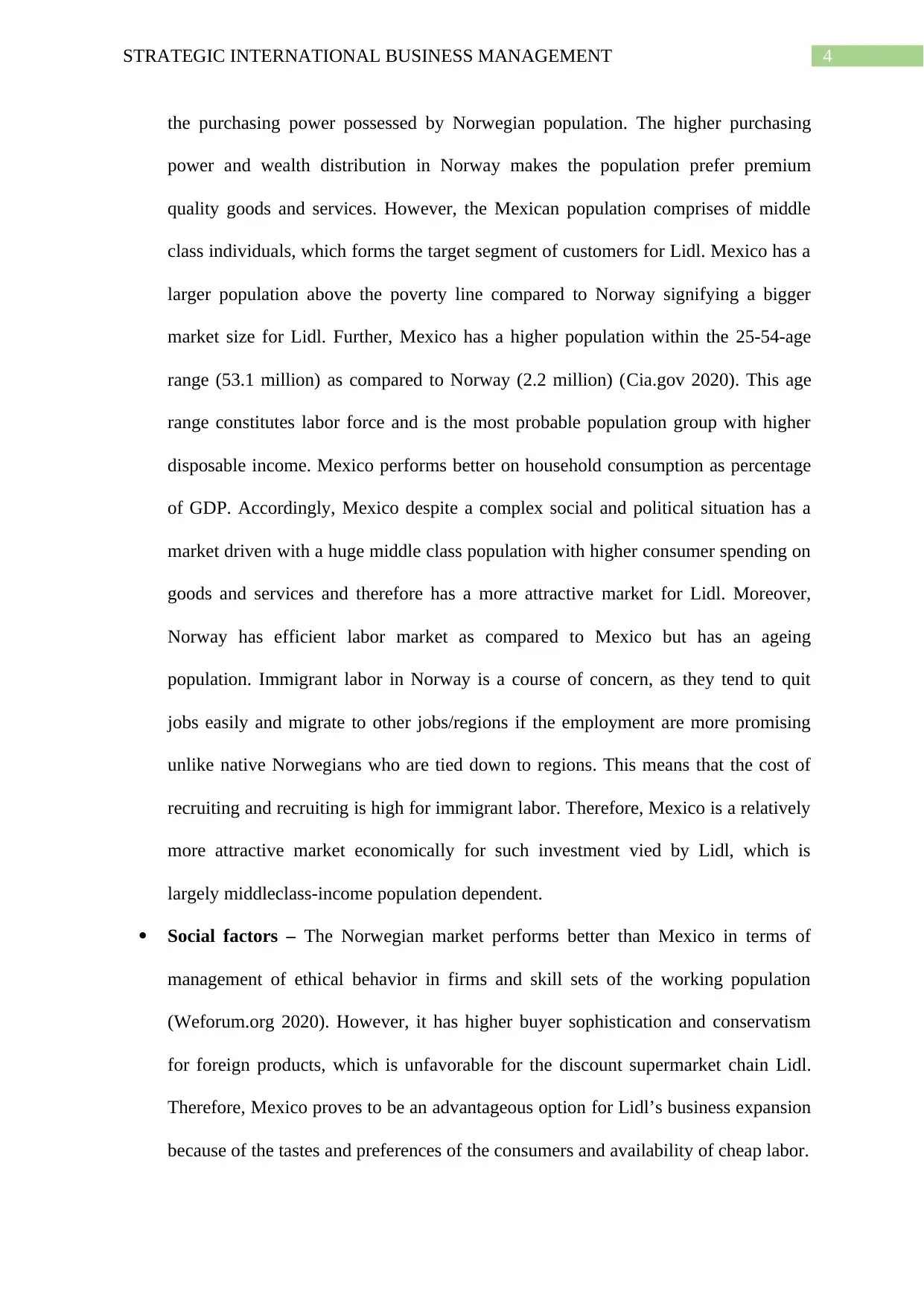
4STRATEGIC INTERNATIONAL BUSINESS MANAGEMENT
the purchasing power possessed by Norwegian population. The higher purchasing
power and wealth distribution in Norway makes the population prefer premium
quality goods and services. However, the Mexican population comprises of middle
class individuals, which forms the target segment of customers for Lidl. Mexico has a
larger population above the poverty line compared to Norway signifying a bigger
market size for Lidl. Further, Mexico has a higher population within the 25-54-age
range (53.1 million) as compared to Norway (2.2 million) (Cia.gov 2020). This age
range constitutes labor force and is the most probable population group with higher
disposable income. Mexico performs better on household consumption as percentage
of GDP. Accordingly, Mexico despite a complex social and political situation has a
market driven with a huge middle class population with higher consumer spending on
goods and services and therefore has a more attractive market for Lidl. Moreover,
Norway has efficient labor market as compared to Mexico but has an ageing
population. Immigrant labor in Norway is a course of concern, as they tend to quit
jobs easily and migrate to other jobs/regions if the employment are more promising
unlike native Norwegians who are tied down to regions. This means that the cost of
recruiting and recruiting is high for immigrant labor. Therefore, Mexico is a relatively
more attractive market economically for such investment vied by Lidl, which is
largely middleclass-income population dependent.
Social factors – The Norwegian market performs better than Mexico in terms of
management of ethical behavior in firms and skill sets of the working population
(Weforum.org 2020). However, it has higher buyer sophistication and conservatism
for foreign products, which is unfavorable for the discount supermarket chain Lidl.
Therefore, Mexico proves to be an advantageous option for Lidl’s business expansion
because of the tastes and preferences of the consumers and availability of cheap labor.
the purchasing power possessed by Norwegian population. The higher purchasing
power and wealth distribution in Norway makes the population prefer premium
quality goods and services. However, the Mexican population comprises of middle
class individuals, which forms the target segment of customers for Lidl. Mexico has a
larger population above the poverty line compared to Norway signifying a bigger
market size for Lidl. Further, Mexico has a higher population within the 25-54-age
range (53.1 million) as compared to Norway (2.2 million) (Cia.gov 2020). This age
range constitutes labor force and is the most probable population group with higher
disposable income. Mexico performs better on household consumption as percentage
of GDP. Accordingly, Mexico despite a complex social and political situation has a
market driven with a huge middle class population with higher consumer spending on
goods and services and therefore has a more attractive market for Lidl. Moreover,
Norway has efficient labor market as compared to Mexico but has an ageing
population. Immigrant labor in Norway is a course of concern, as they tend to quit
jobs easily and migrate to other jobs/regions if the employment are more promising
unlike native Norwegians who are tied down to regions. This means that the cost of
recruiting and recruiting is high for immigrant labor. Therefore, Mexico is a relatively
more attractive market economically for such investment vied by Lidl, which is
largely middleclass-income population dependent.
Social factors – The Norwegian market performs better than Mexico in terms of
management of ethical behavior in firms and skill sets of the working population
(Weforum.org 2020). However, it has higher buyer sophistication and conservatism
for foreign products, which is unfavorable for the discount supermarket chain Lidl.
Therefore, Mexico proves to be an advantageous option for Lidl’s business expansion
because of the tastes and preferences of the consumers and availability of cheap labor.
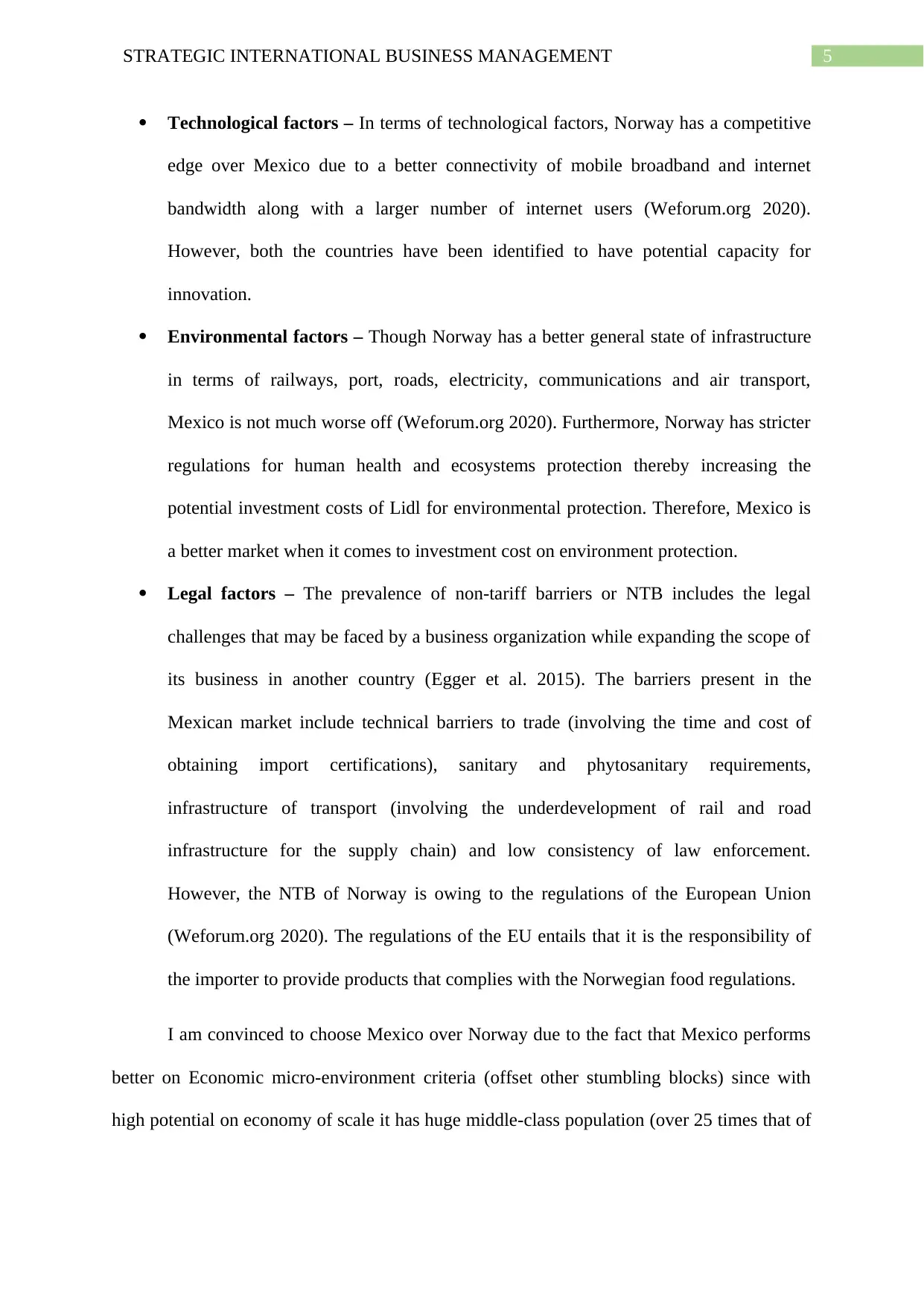
5STRATEGIC INTERNATIONAL BUSINESS MANAGEMENT
Technological factors – In terms of technological factors, Norway has a competitive
edge over Mexico due to a better connectivity of mobile broadband and internet
bandwidth along with a larger number of internet users (Weforum.org 2020).
However, both the countries have been identified to have potential capacity for
innovation.
Environmental factors – Though Norway has a better general state of infrastructure
in terms of railways, port, roads, electricity, communications and air transport,
Mexico is not much worse off (Weforum.org 2020). Furthermore, Norway has stricter
regulations for human health and ecosystems protection thereby increasing the
potential investment costs of Lidl for environmental protection. Therefore, Mexico is
a better market when it comes to investment cost on environment protection.
Legal factors – The prevalence of non-tariff barriers or NTB includes the legal
challenges that may be faced by a business organization while expanding the scope of
its business in another country (Egger et al. 2015). The barriers present in the
Mexican market include technical barriers to trade (involving the time and cost of
obtaining import certifications), sanitary and phytosanitary requirements,
infrastructure of transport (involving the underdevelopment of rail and road
infrastructure for the supply chain) and low consistency of law enforcement.
However, the NTB of Norway is owing to the regulations of the European Union
(Weforum.org 2020). The regulations of the EU entails that it is the responsibility of
the importer to provide products that complies with the Norwegian food regulations.
I am convinced to choose Mexico over Norway due to the fact that Mexico performs
better on Economic micro-environment criteria (offset other stumbling blocks) since with
high potential on economy of scale it has huge middle-class population (over 25 times that of
Technological factors – In terms of technological factors, Norway has a competitive
edge over Mexico due to a better connectivity of mobile broadband and internet
bandwidth along with a larger number of internet users (Weforum.org 2020).
However, both the countries have been identified to have potential capacity for
innovation.
Environmental factors – Though Norway has a better general state of infrastructure
in terms of railways, port, roads, electricity, communications and air transport,
Mexico is not much worse off (Weforum.org 2020). Furthermore, Norway has stricter
regulations for human health and ecosystems protection thereby increasing the
potential investment costs of Lidl for environmental protection. Therefore, Mexico is
a better market when it comes to investment cost on environment protection.
Legal factors – The prevalence of non-tariff barriers or NTB includes the legal
challenges that may be faced by a business organization while expanding the scope of
its business in another country (Egger et al. 2015). The barriers present in the
Mexican market include technical barriers to trade (involving the time and cost of
obtaining import certifications), sanitary and phytosanitary requirements,
infrastructure of transport (involving the underdevelopment of rail and road
infrastructure for the supply chain) and low consistency of law enforcement.
However, the NTB of Norway is owing to the regulations of the European Union
(Weforum.org 2020). The regulations of the EU entails that it is the responsibility of
the importer to provide products that complies with the Norwegian food regulations.
I am convinced to choose Mexico over Norway due to the fact that Mexico performs
better on Economic micro-environment criteria (offset other stumbling blocks) since with
high potential on economy of scale it has huge middle-class population (over 25 times that of
⊘ This is a preview!⊘
Do you want full access?
Subscribe today to unlock all pages.

Trusted by 1+ million students worldwide
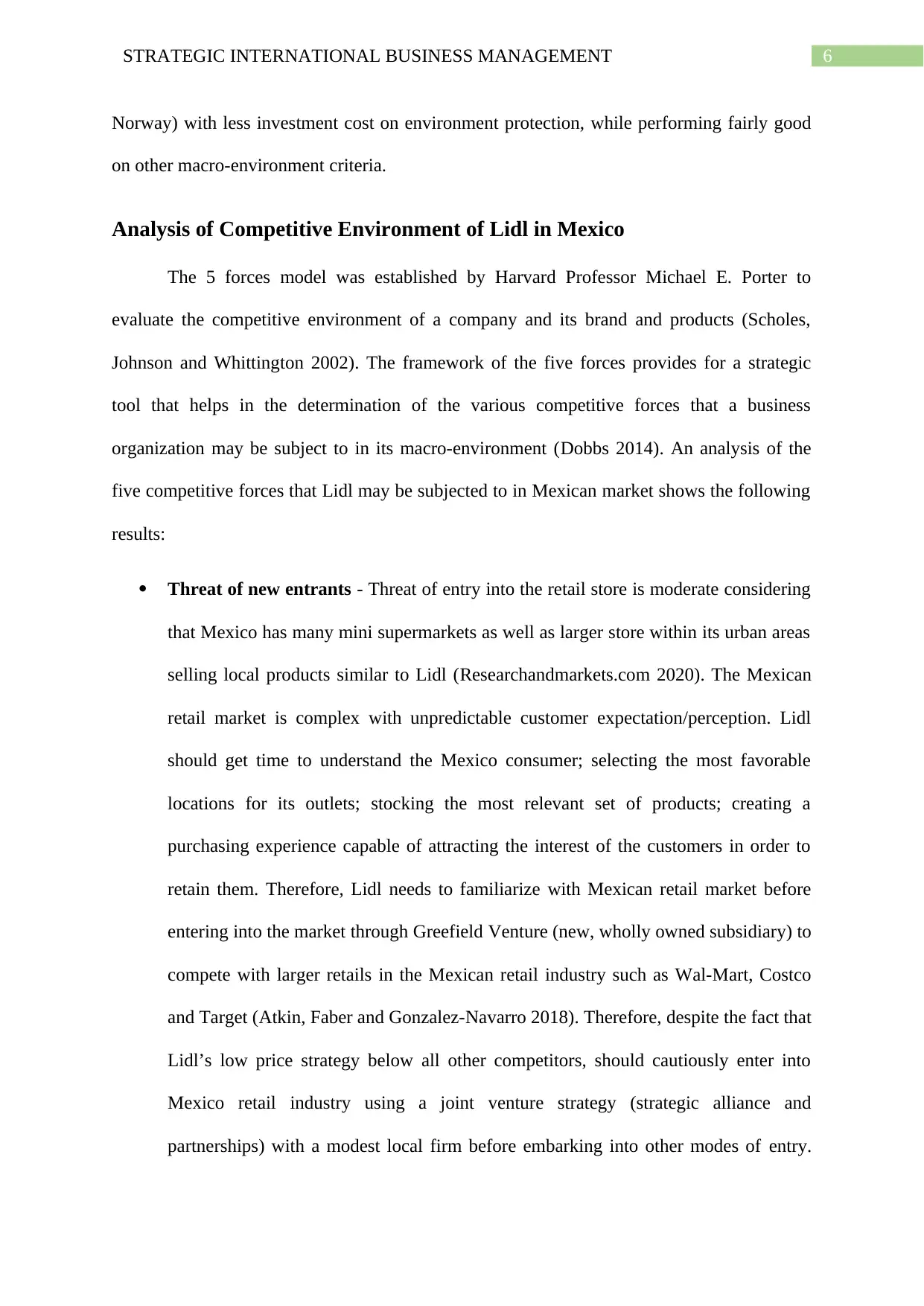
6STRATEGIC INTERNATIONAL BUSINESS MANAGEMENT
Norway) with less investment cost on environment protection, while performing fairly good
on other macro-environment criteria.
Analysis of Competitive Environment of Lidl in Mexico
The 5 forces model was established by Harvard Professor Michael E. Porter to
evaluate the competitive environment of a company and its brand and products (Scholes,
Johnson and Whittington 2002). The framework of the five forces provides for a strategic
tool that helps in the determination of the various competitive forces that a business
organization may be subject to in its macro-environment (Dobbs 2014). An analysis of the
five competitive forces that Lidl may be subjected to in Mexican market shows the following
results:
Threat of new entrants - Threat of entry into the retail store is moderate considering
that Mexico has many mini supermarkets as well as larger store within its urban areas
selling local products similar to Lidl (Researchandmarkets.com 2020). The Mexican
retail market is complex with unpredictable customer expectation/perception. Lidl
should get time to understand the Mexico consumer; selecting the most favorable
locations for its outlets; stocking the most relevant set of products; creating a
purchasing experience capable of attracting the interest of the customers in order to
retain them. Therefore, Lidl needs to familiarize with Mexican retail market before
entering into the market through Greefield Venture (new, wholly owned subsidiary) to
compete with larger retails in the Mexican retail industry such as Wal-Mart, Costco
and Target (Atkin, Faber and Gonzalez-Navarro 2018). Therefore, despite the fact that
Lidl’s low price strategy below all other competitors, should cautiously enter into
Mexico retail industry using a joint venture strategy (strategic alliance and
partnerships) with a modest local firm before embarking into other modes of entry.
Norway) with less investment cost on environment protection, while performing fairly good
on other macro-environment criteria.
Analysis of Competitive Environment of Lidl in Mexico
The 5 forces model was established by Harvard Professor Michael E. Porter to
evaluate the competitive environment of a company and its brand and products (Scholes,
Johnson and Whittington 2002). The framework of the five forces provides for a strategic
tool that helps in the determination of the various competitive forces that a business
organization may be subject to in its macro-environment (Dobbs 2014). An analysis of the
five competitive forces that Lidl may be subjected to in Mexican market shows the following
results:
Threat of new entrants - Threat of entry into the retail store is moderate considering
that Mexico has many mini supermarkets as well as larger store within its urban areas
selling local products similar to Lidl (Researchandmarkets.com 2020). The Mexican
retail market is complex with unpredictable customer expectation/perception. Lidl
should get time to understand the Mexico consumer; selecting the most favorable
locations for its outlets; stocking the most relevant set of products; creating a
purchasing experience capable of attracting the interest of the customers in order to
retain them. Therefore, Lidl needs to familiarize with Mexican retail market before
entering into the market through Greefield Venture (new, wholly owned subsidiary) to
compete with larger retails in the Mexican retail industry such as Wal-Mart, Costco
and Target (Atkin, Faber and Gonzalez-Navarro 2018). Therefore, despite the fact that
Lidl’s low price strategy below all other competitors, should cautiously enter into
Mexico retail industry using a joint venture strategy (strategic alliance and
partnerships) with a modest local firm before embarking into other modes of entry.
Paraphrase This Document
Need a fresh take? Get an instant paraphrase of this document with our AI Paraphraser
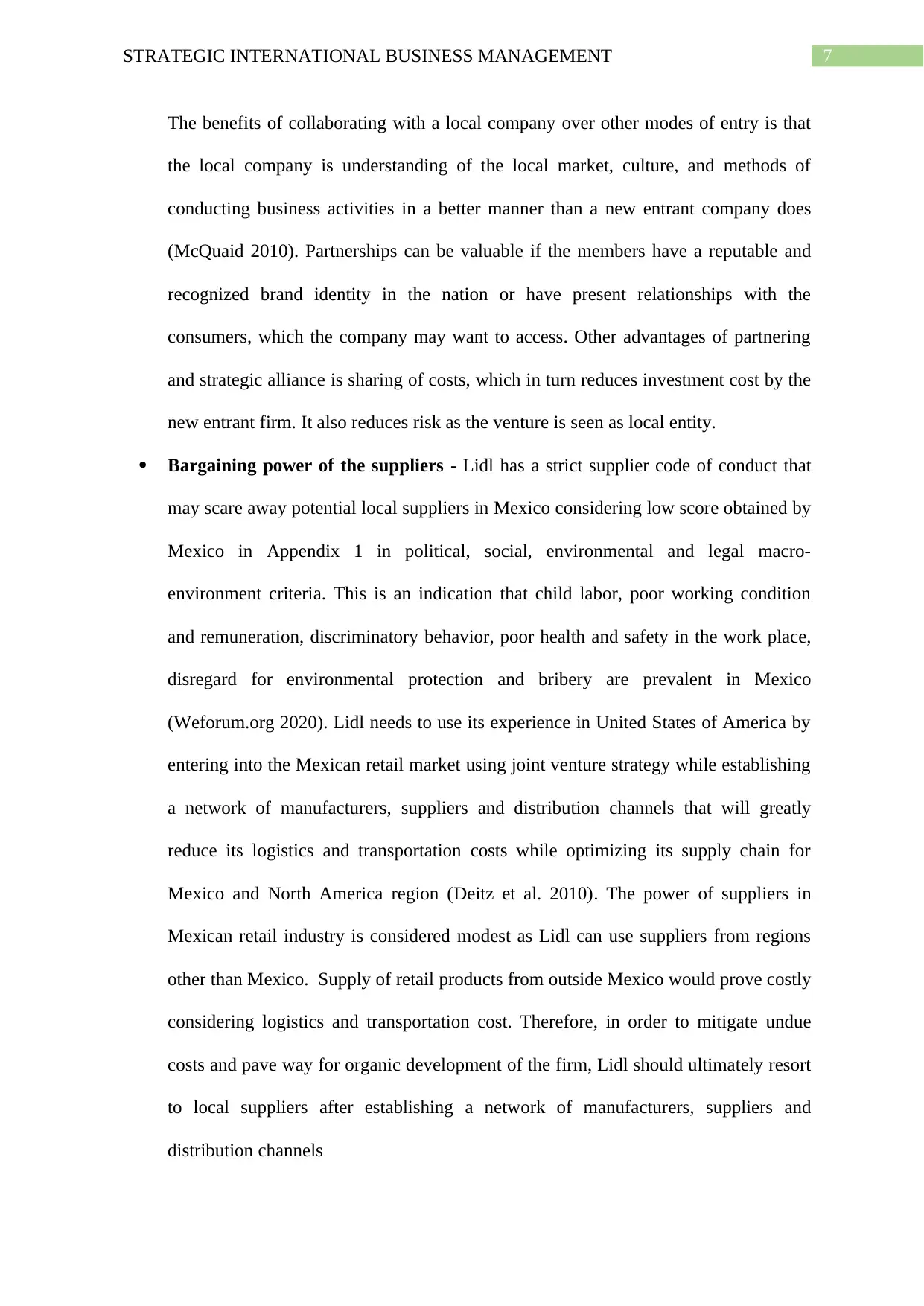
7STRATEGIC INTERNATIONAL BUSINESS MANAGEMENT
The benefits of collaborating with a local company over other modes of entry is that
the local company is understanding of the local market, culture, and methods of
conducting business activities in a better manner than a new entrant company does
(McQuaid 2010). Partnerships can be valuable if the members have a reputable and
recognized brand identity in the nation or have present relationships with the
consumers, which the company may want to access. Other advantages of partnering
and strategic alliance is sharing of costs, which in turn reduces investment cost by the
new entrant firm. It also reduces risk as the venture is seen as local entity.
Bargaining power of the suppliers - Lidl has a strict supplier code of conduct that
may scare away potential local suppliers in Mexico considering low score obtained by
Mexico in Appendix 1 in political, social, environmental and legal macro-
environment criteria. This is an indication that child labor, poor working condition
and remuneration, discriminatory behavior, poor health and safety in the work place,
disregard for environmental protection and bribery are prevalent in Mexico
(Weforum.org 2020). Lidl needs to use its experience in United States of America by
entering into the Mexican retail market using joint venture strategy while establishing
a network of manufacturers, suppliers and distribution channels that will greatly
reduce its logistics and transportation costs while optimizing its supply chain for
Mexico and North America region (Deitz et al. 2010). The power of suppliers in
Mexican retail industry is considered modest as Lidl can use suppliers from regions
other than Mexico. Supply of retail products from outside Mexico would prove costly
considering logistics and transportation cost. Therefore, in order to mitigate undue
costs and pave way for organic development of the firm, Lidl should ultimately resort
to local suppliers after establishing a network of manufacturers, suppliers and
distribution channels
The benefits of collaborating with a local company over other modes of entry is that
the local company is understanding of the local market, culture, and methods of
conducting business activities in a better manner than a new entrant company does
(McQuaid 2010). Partnerships can be valuable if the members have a reputable and
recognized brand identity in the nation or have present relationships with the
consumers, which the company may want to access. Other advantages of partnering
and strategic alliance is sharing of costs, which in turn reduces investment cost by the
new entrant firm. It also reduces risk as the venture is seen as local entity.
Bargaining power of the suppliers - Lidl has a strict supplier code of conduct that
may scare away potential local suppliers in Mexico considering low score obtained by
Mexico in Appendix 1 in political, social, environmental and legal macro-
environment criteria. This is an indication that child labor, poor working condition
and remuneration, discriminatory behavior, poor health and safety in the work place,
disregard for environmental protection and bribery are prevalent in Mexico
(Weforum.org 2020). Lidl needs to use its experience in United States of America by
entering into the Mexican retail market using joint venture strategy while establishing
a network of manufacturers, suppliers and distribution channels that will greatly
reduce its logistics and transportation costs while optimizing its supply chain for
Mexico and North America region (Deitz et al. 2010). The power of suppliers in
Mexican retail industry is considered modest as Lidl can use suppliers from regions
other than Mexico. Supply of retail products from outside Mexico would prove costly
considering logistics and transportation cost. Therefore, in order to mitigate undue
costs and pave way for organic development of the firm, Lidl should ultimately resort
to local suppliers after establishing a network of manufacturers, suppliers and
distribution channels
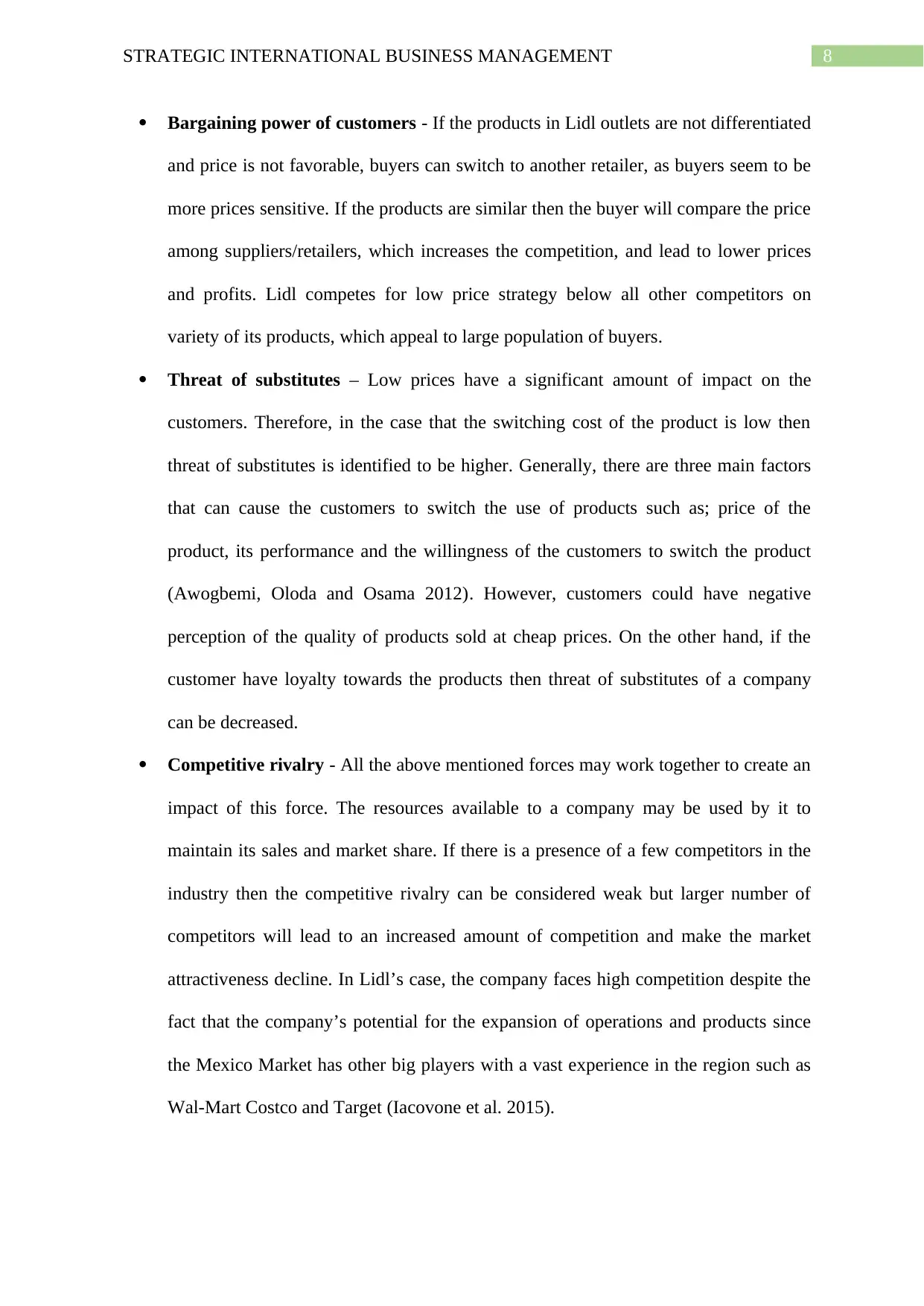
8STRATEGIC INTERNATIONAL BUSINESS MANAGEMENT
Bargaining power of customers - If the products in Lidl outlets are not differentiated
and price is not favorable, buyers can switch to another retailer, as buyers seem to be
more prices sensitive. If the products are similar then the buyer will compare the price
among suppliers/retailers, which increases the competition, and lead to lower prices
and profits. Lidl competes for low price strategy below all other competitors on
variety of its products, which appeal to large population of buyers.
Threat of substitutes – Low prices have a significant amount of impact on the
customers. Therefore, in the case that the switching cost of the product is low then
threat of substitutes is identified to be higher. Generally, there are three main factors
that can cause the customers to switch the use of products such as; price of the
product, its performance and the willingness of the customers to switch the product
(Awogbemi, Oloda and Osama 2012). However, customers could have negative
perception of the quality of products sold at cheap prices. On the other hand, if the
customer have loyalty towards the products then threat of substitutes of a company
can be decreased.
Competitive rivalry - All the above mentioned forces may work together to create an
impact of this force. The resources available to a company may be used by it to
maintain its sales and market share. If there is a presence of a few competitors in the
industry then the competitive rivalry can be considered weak but larger number of
competitors will lead to an increased amount of competition and make the market
attractiveness decline. In Lidl’s case, the company faces high competition despite the
fact that the company’s potential for the expansion of operations and products since
the Mexico Market has other big players with a vast experience in the region such as
Wal-Mart Costco and Target (Iacovone et al. 2015).
Bargaining power of customers - If the products in Lidl outlets are not differentiated
and price is not favorable, buyers can switch to another retailer, as buyers seem to be
more prices sensitive. If the products are similar then the buyer will compare the price
among suppliers/retailers, which increases the competition, and lead to lower prices
and profits. Lidl competes for low price strategy below all other competitors on
variety of its products, which appeal to large population of buyers.
Threat of substitutes – Low prices have a significant amount of impact on the
customers. Therefore, in the case that the switching cost of the product is low then
threat of substitutes is identified to be higher. Generally, there are three main factors
that can cause the customers to switch the use of products such as; price of the
product, its performance and the willingness of the customers to switch the product
(Awogbemi, Oloda and Osama 2012). However, customers could have negative
perception of the quality of products sold at cheap prices. On the other hand, if the
customer have loyalty towards the products then threat of substitutes of a company
can be decreased.
Competitive rivalry - All the above mentioned forces may work together to create an
impact of this force. The resources available to a company may be used by it to
maintain its sales and market share. If there is a presence of a few competitors in the
industry then the competitive rivalry can be considered weak but larger number of
competitors will lead to an increased amount of competition and make the market
attractiveness decline. In Lidl’s case, the company faces high competition despite the
fact that the company’s potential for the expansion of operations and products since
the Mexico Market has other big players with a vast experience in the region such as
Wal-Mart Costco and Target (Iacovone et al. 2015).
⊘ This is a preview!⊘
Do you want full access?
Subscribe today to unlock all pages.

Trusted by 1+ million students worldwide
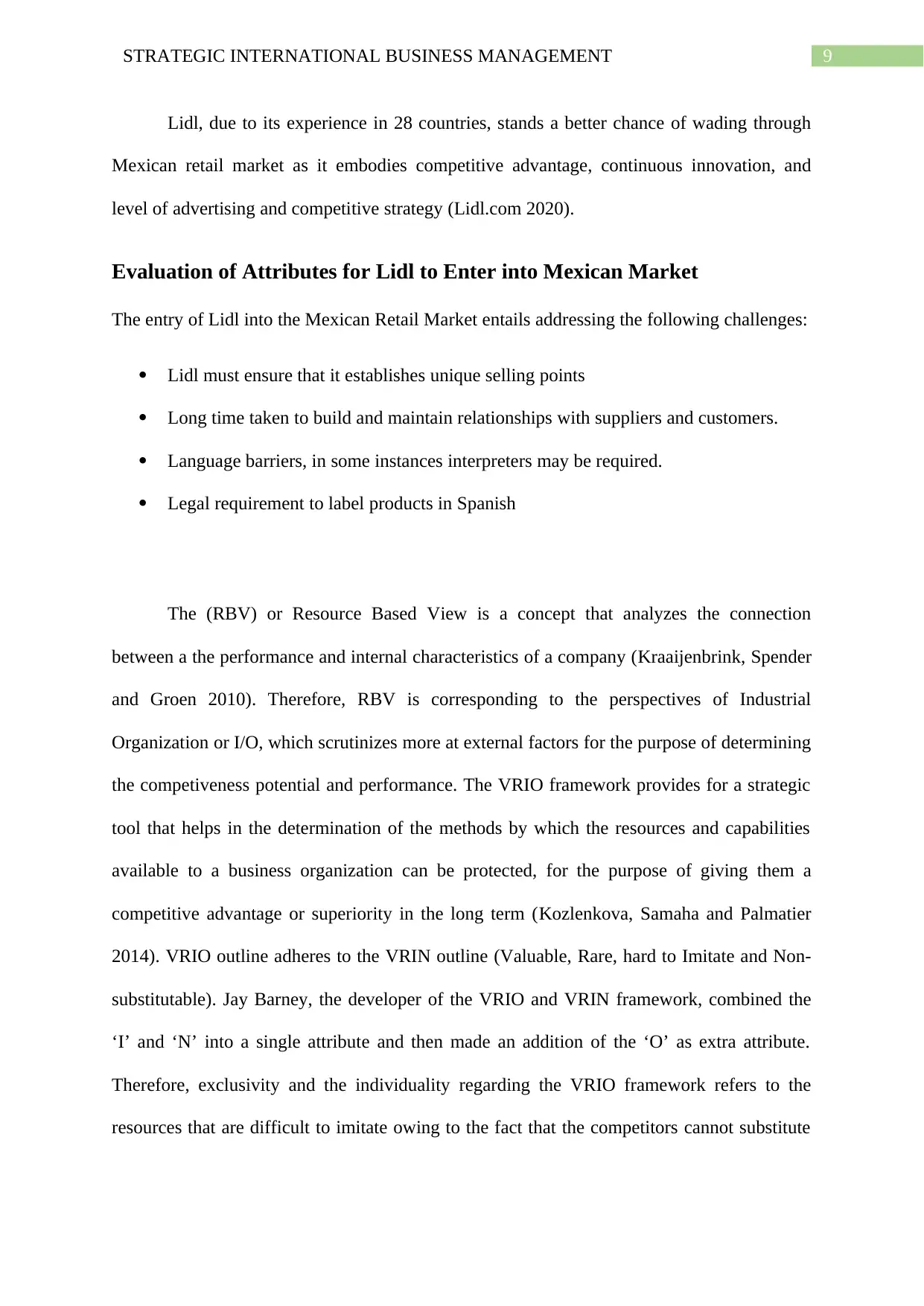
9STRATEGIC INTERNATIONAL BUSINESS MANAGEMENT
Lidl, due to its experience in 28 countries, stands a better chance of wading through
Mexican retail market as it embodies competitive advantage, continuous innovation, and
level of advertising and competitive strategy (Lidl.com 2020).
Evaluation of Attributes for Lidl to Enter into Mexican Market
The entry of Lidl into the Mexican Retail Market entails addressing the following challenges:
Lidl must ensure that it establishes unique selling points
Long time taken to build and maintain relationships with suppliers and customers.
Language barriers, in some instances interpreters may be required.
Legal requirement to label products in Spanish
The (RBV) or Resource Based View is a concept that analyzes the connection
between a the performance and internal characteristics of a company (Kraaijenbrink, Spender
and Groen 2010). Therefore, RBV is corresponding to the perspectives of Industrial
Organization or I/O, which scrutinizes more at external factors for the purpose of determining
the competiveness potential and performance. The VRIO framework provides for a strategic
tool that helps in the determination of the methods by which the resources and capabilities
available to a business organization can be protected, for the purpose of giving them a
competitive advantage or superiority in the long term (Kozlenkova, Samaha and Palmatier
2014). VRIO outline adheres to the VRIN outline (Valuable, Rare, hard to Imitate and Non-
substitutable). Jay Barney, the developer of the VRIO and VRIN framework, combined the
‘I’ and ‘N’ into a single attribute and then made an addition of the ‘O’ as extra attribute.
Therefore, exclusivity and the individuality regarding the VRIO framework refers to the
resources that are difficult to imitate owing to the fact that the competitors cannot substitute
Lidl, due to its experience in 28 countries, stands a better chance of wading through
Mexican retail market as it embodies competitive advantage, continuous innovation, and
level of advertising and competitive strategy (Lidl.com 2020).
Evaluation of Attributes for Lidl to Enter into Mexican Market
The entry of Lidl into the Mexican Retail Market entails addressing the following challenges:
Lidl must ensure that it establishes unique selling points
Long time taken to build and maintain relationships with suppliers and customers.
Language barriers, in some instances interpreters may be required.
Legal requirement to label products in Spanish
The (RBV) or Resource Based View is a concept that analyzes the connection
between a the performance and internal characteristics of a company (Kraaijenbrink, Spender
and Groen 2010). Therefore, RBV is corresponding to the perspectives of Industrial
Organization or I/O, which scrutinizes more at external factors for the purpose of determining
the competiveness potential and performance. The VRIO framework provides for a strategic
tool that helps in the determination of the methods by which the resources and capabilities
available to a business organization can be protected, for the purpose of giving them a
competitive advantage or superiority in the long term (Kozlenkova, Samaha and Palmatier
2014). VRIO outline adheres to the VRIN outline (Valuable, Rare, hard to Imitate and Non-
substitutable). Jay Barney, the developer of the VRIO and VRIN framework, combined the
‘I’ and ‘N’ into a single attribute and then made an addition of the ‘O’ as extra attribute.
Therefore, exclusivity and the individuality regarding the VRIO framework refers to the
resources that are difficult to imitate owing to the fact that the competitors cannot substitute
Paraphrase This Document
Need a fresh take? Get an instant paraphrase of this document with our AI Paraphraser
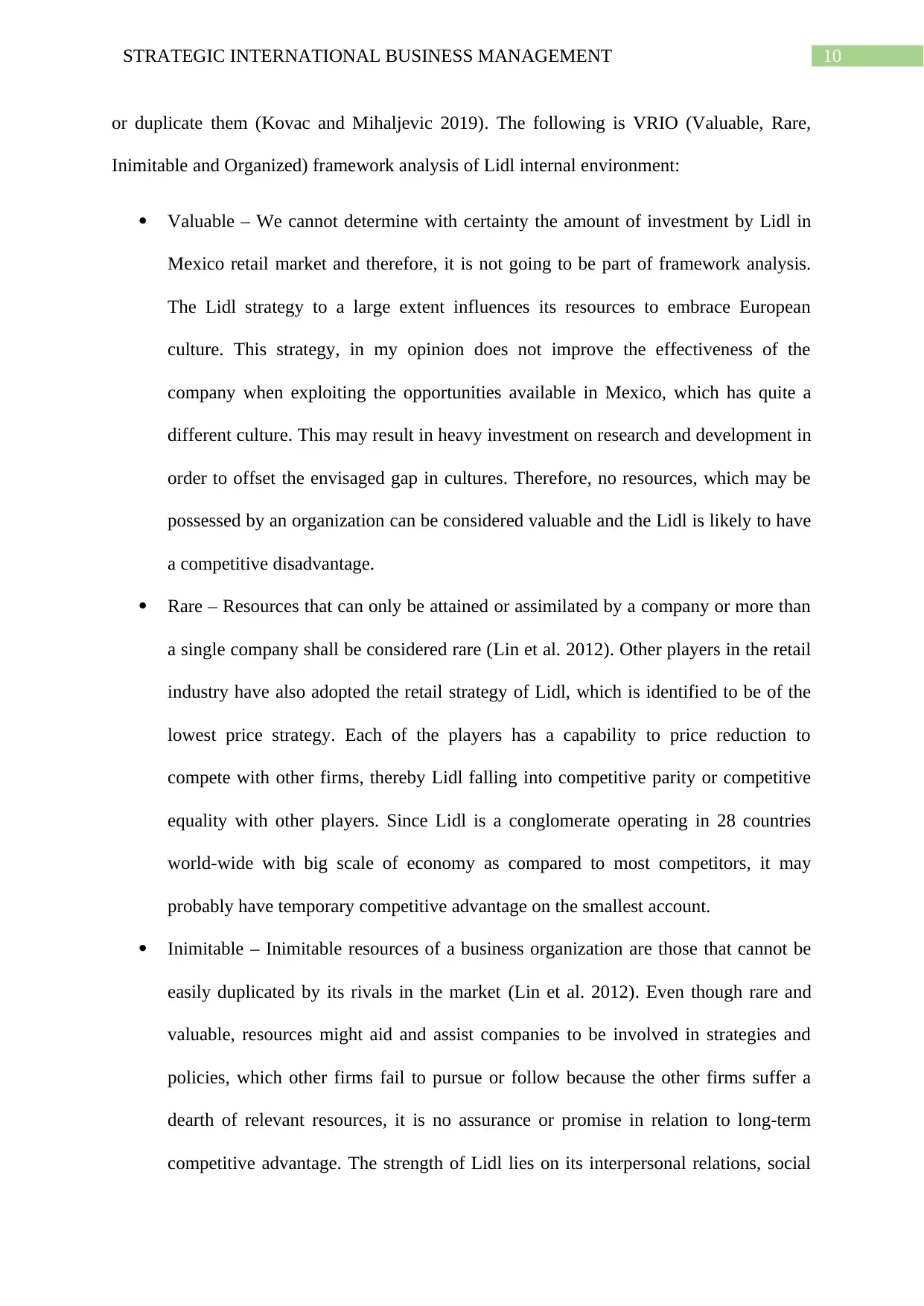
10STRATEGIC INTERNATIONAL BUSINESS MANAGEMENT
or duplicate them (Kovac and Mihaljevic 2019). The following is VRIO (Valuable, Rare,
Inimitable and Organized) framework analysis of Lidl internal environment:
Valuable – We cannot determine with certainty the amount of investment by Lidl in
Mexico retail market and therefore, it is not going to be part of framework analysis.
The Lidl strategy to a large extent influences its resources to embrace European
culture. This strategy, in my opinion does not improve the effectiveness of the
company when exploiting the opportunities available in Mexico, which has quite a
different culture. This may result in heavy investment on research and development in
order to offset the envisaged gap in cultures. Therefore, no resources, which may be
possessed by an organization can be considered valuable and the Lidl is likely to have
a competitive disadvantage.
Rare – Resources that can only be attained or assimilated by a company or more than
a single company shall be considered rare (Lin et al. 2012). Other players in the retail
industry have also adopted the retail strategy of Lidl, which is identified to be of the
lowest price strategy. Each of the players has a capability to price reduction to
compete with other firms, thereby Lidl falling into competitive parity or competitive
equality with other players. Since Lidl is a conglomerate operating in 28 countries
world-wide with big scale of economy as compared to most competitors, it may
probably have temporary competitive advantage on the smallest account.
Inimitable – Inimitable resources of a business organization are those that cannot be
easily duplicated by its rivals in the market (Lin et al. 2012). Even though rare and
valuable, resources might aid and assist companies to be involved in strategies and
policies, which other firms fail to pursue or follow because the other firms suffer a
dearth of relevant resources, it is no assurance or promise in relation to long-term
competitive advantage. The strength of Lidl lies on its interpersonal relations, social
or duplicate them (Kovac and Mihaljevic 2019). The following is VRIO (Valuable, Rare,
Inimitable and Organized) framework analysis of Lidl internal environment:
Valuable – We cannot determine with certainty the amount of investment by Lidl in
Mexico retail market and therefore, it is not going to be part of framework analysis.
The Lidl strategy to a large extent influences its resources to embrace European
culture. This strategy, in my opinion does not improve the effectiveness of the
company when exploiting the opportunities available in Mexico, which has quite a
different culture. This may result in heavy investment on research and development in
order to offset the envisaged gap in cultures. Therefore, no resources, which may be
possessed by an organization can be considered valuable and the Lidl is likely to have
a competitive disadvantage.
Rare – Resources that can only be attained or assimilated by a company or more than
a single company shall be considered rare (Lin et al. 2012). Other players in the retail
industry have also adopted the retail strategy of Lidl, which is identified to be of the
lowest price strategy. Each of the players has a capability to price reduction to
compete with other firms, thereby Lidl falling into competitive parity or competitive
equality with other players. Since Lidl is a conglomerate operating in 28 countries
world-wide with big scale of economy as compared to most competitors, it may
probably have temporary competitive advantage on the smallest account.
Inimitable – Inimitable resources of a business organization are those that cannot be
easily duplicated by its rivals in the market (Lin et al. 2012). Even though rare and
valuable, resources might aid and assist companies to be involved in strategies and
policies, which other firms fail to pursue or follow because the other firms suffer a
dearth of relevant resources, it is no assurance or promise in relation to long-term
competitive advantage. The strength of Lidl lies on its interpersonal relations, social
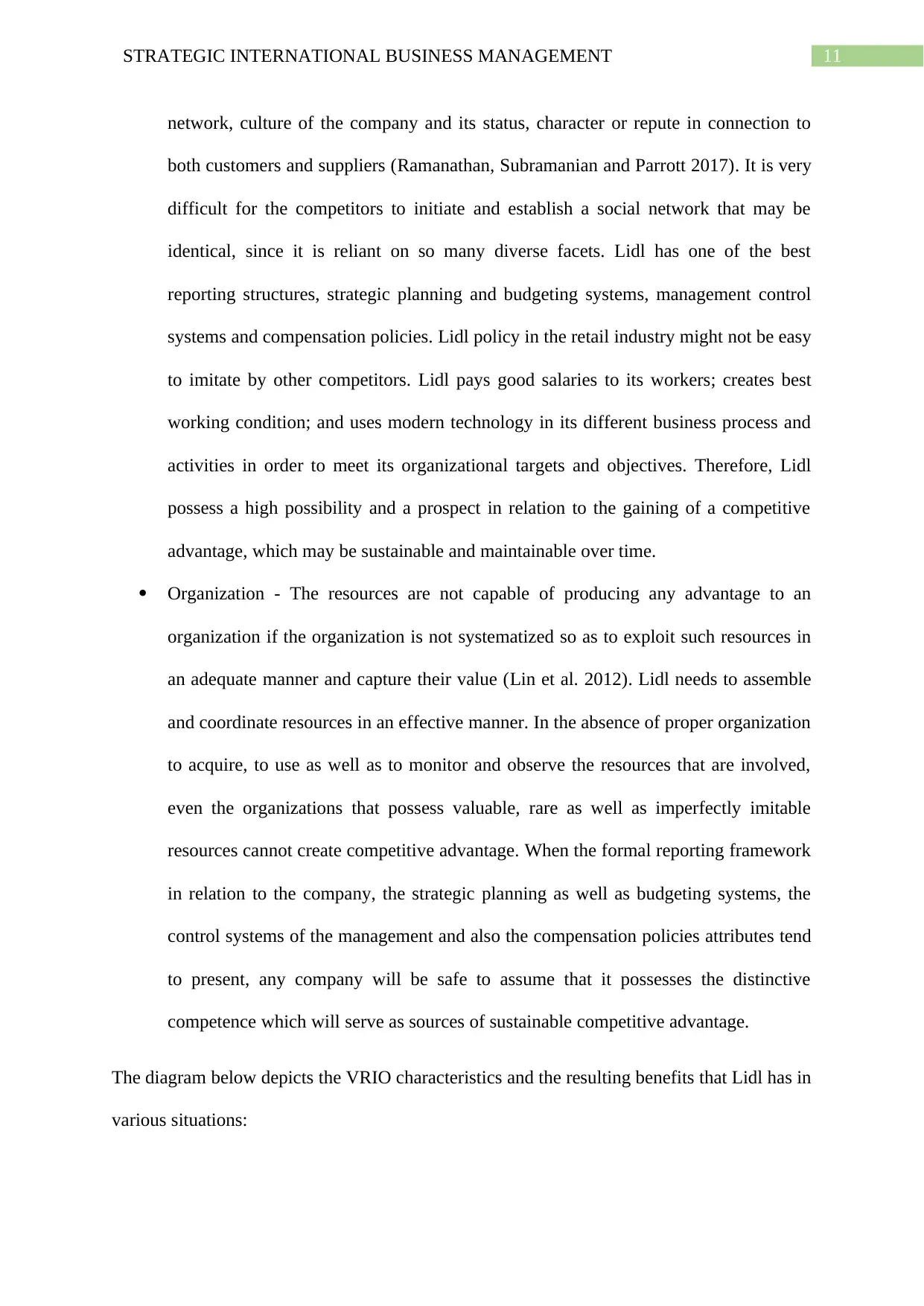
11STRATEGIC INTERNATIONAL BUSINESS MANAGEMENT
network, culture of the company and its status, character or repute in connection to
both customers and suppliers (Ramanathan, Subramanian and Parrott 2017). It is very
difficult for the competitors to initiate and establish a social network that may be
identical, since it is reliant on so many diverse facets. Lidl has one of the best
reporting structures, strategic planning and budgeting systems, management control
systems and compensation policies. Lidl policy in the retail industry might not be easy
to imitate by other competitors. Lidl pays good salaries to its workers; creates best
working condition; and uses modern technology in its different business process and
activities in order to meet its organizational targets and objectives. Therefore, Lidl
possess a high possibility and a prospect in relation to the gaining of a competitive
advantage, which may be sustainable and maintainable over time.
Organization - The resources are not capable of producing any advantage to an
organization if the organization is not systematized so as to exploit such resources in
an adequate manner and capture their value (Lin et al. 2012). Lidl needs to assemble
and coordinate resources in an effective manner. In the absence of proper organization
to acquire, to use as well as to monitor and observe the resources that are involved,
even the organizations that possess valuable, rare as well as imperfectly imitable
resources cannot create competitive advantage. When the formal reporting framework
in relation to the company, the strategic planning as well as budgeting systems, the
control systems of the management and also the compensation policies attributes tend
to present, any company will be safe to assume that it possesses the distinctive
competence which will serve as sources of sustainable competitive advantage.
The diagram below depicts the VRIO characteristics and the resulting benefits that Lidl has in
various situations:
network, culture of the company and its status, character or repute in connection to
both customers and suppliers (Ramanathan, Subramanian and Parrott 2017). It is very
difficult for the competitors to initiate and establish a social network that may be
identical, since it is reliant on so many diverse facets. Lidl has one of the best
reporting structures, strategic planning and budgeting systems, management control
systems and compensation policies. Lidl policy in the retail industry might not be easy
to imitate by other competitors. Lidl pays good salaries to its workers; creates best
working condition; and uses modern technology in its different business process and
activities in order to meet its organizational targets and objectives. Therefore, Lidl
possess a high possibility and a prospect in relation to the gaining of a competitive
advantage, which may be sustainable and maintainable over time.
Organization - The resources are not capable of producing any advantage to an
organization if the organization is not systematized so as to exploit such resources in
an adequate manner and capture their value (Lin et al. 2012). Lidl needs to assemble
and coordinate resources in an effective manner. In the absence of proper organization
to acquire, to use as well as to monitor and observe the resources that are involved,
even the organizations that possess valuable, rare as well as imperfectly imitable
resources cannot create competitive advantage. When the formal reporting framework
in relation to the company, the strategic planning as well as budgeting systems, the
control systems of the management and also the compensation policies attributes tend
to present, any company will be safe to assume that it possesses the distinctive
competence which will serve as sources of sustainable competitive advantage.
The diagram below depicts the VRIO characteristics and the resulting benefits that Lidl has in
various situations:
⊘ This is a preview!⊘
Do you want full access?
Subscribe today to unlock all pages.

Trusted by 1+ million students worldwide
1 out of 30
Related Documents
Your All-in-One AI-Powered Toolkit for Academic Success.
+13062052269
info@desklib.com
Available 24*7 on WhatsApp / Email
![[object Object]](/_next/static/media/star-bottom.7253800d.svg)
Unlock your academic potential
Copyright © 2020–2026 A2Z Services. All Rights Reserved. Developed and managed by ZUCOL.





